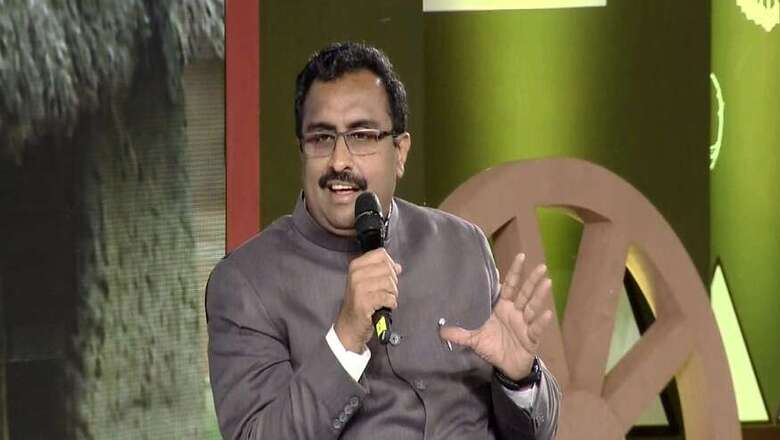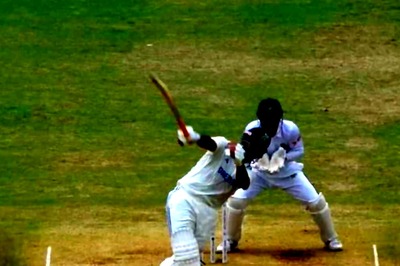
views
New Delhi: In a candid interview with CNN-News18’s Marya Shakil, BJP national general secretary Ram Madhav on Thursday said the government would ensure development, investment and outreach for the two newest Union Territories of India created by reshaping the state of Jammu and Kashmir, while also promising that the country was prepared to deal with any trouble emerging from the neighbourhood.
Is the situation in the Kashmir Valley as well as the international response in line with what you had anticipated when the government announced the abrogation of provisions of Article 370?
We took our own time to take this very significant decision. You know the government has been there for more than five years now. We waited for this moment because we wanted to create an impeccable atmosphere in the country. And the kind of response we are seeing even in the Kashmir Valley tells clearly that, broadly, the people of the country including the people of Kashmir have welcomed or accepted this decision with open hearts. And that is the intention behind waiting for so many years.
Now this is a very significant thing; the significance of it has to sink into the minds of the people of Kashmir Valley. They have to fully understand the importance of it. In the last 72 hours, there has not been any untoward incident or any unpleasant development in the Valley. Also, there was some letup in curfew and today also there is a free atmosphere in the Valley. In fact, shops are slowly opening. I think things will gradually come back to normal very soon.
What about the United Nations and United States: the fact that they are talking about the detention of leaders in the Valley and continued restrictions?
Article 370 has been amended almost 45 times in the last 70 years. What we have done, in fact, is not full abrogation. Article 370 is still there, but a number of the clauses that were coming in the way of full integration and full development of the state have been completely revoked. That being the situation, we should tell the world community that nobody else has any locus standi as this is our internal matter. If amending it 45 times did not attract any international attention, then why should it attract any international attention the 46th or 47th time? So, at least we Indians should be clear about it. We will see what happens in the United Nations when Pakistan takes the matter there.
About detention of leaders, you see we are all in politics. Preventive detention is common for politicians; very soon everything will be normal. Only a couple of leaders have been put under house arrest. Not even house arrest; they have been put in the guesthouse Hari Niwas in Srinagar. As soon as normalcy is restored, we will set them free.
The reaction from our immediate neighbour, Pakistan, began with warnings that this could lead to war and then expulsion of the Indian high commissioner and even downgrading of ties. Was all this factored in?
We have to tackle things as they come. But the central issue remains that Article 370 is a part of our constitution. The sovereign right to amend it lies with the Government of India and Parliament of India. And that’s what we did. If Pakistan reacts in an irrational way, the way it is reacting today, it will be handled.
You have made significant headway in talks on the Kartarpur Corridor. In fact, 90 per cent of it is already built. Do you think the kind of talk coming from Imran Khan and the narrative he is trying to build will impact the movement and development so far with regard to the corridor?
Kartarpur Corridor has seen a lot of deliberation in the past several months. We had to repeatedly engage with the Pakistani government on various issues. I don’t want to go into the details. I hope Pakistan will not go back on whatever progress has been made in terms of opening up of that corridor for Indian pilgrims. But we will have to deal with the situation as it comes.
Ghulam Nabi Azad suggested that the people chatting and sharing a meal with the national security adviser in Kashmir were bought.
(Laughs) Is Ghulam Nabi Azad trying to tell us that Jyotiraditya Scindia has been bought? Is he trying to tell us that Milind Deora has been bought? Those who are talking to the Government of India and talking in favour of it from his own party, have all of them been bought by us? Doesn’t he have any faith in his own people’s conscience, in his own people’s integrity? He is not questioning the Government of India. He is questioning the integrity and conscience of the people of Kashmir. This is the way leaders like Azad have treated the people of Kashmir all this while. For them, they were just slaves.
You have said this abrogation is emotional integration. But the question is how can there be emotional integration without dialogue with the people of Jammu and Kashmir amid this information black hole and complete lockdown?
This dialogue has been going on for many decades as far as we are concerned. My example may not be the best, but I will tell you how the process has always been progressing… We held rallies, we informed the people when there was hype created by Mehbooba (Mufti) and other supporters that something very dangerous was going to happen in the Valley. I went and told the people not to worry and that whatever decisions we will take will be in the larger interest of the people of the state. We have been constantly talking to the people.
If people in the Valley, according to you, were so in favour of Article 370 provisions to be done away with then let them celebrate. How will they celebrate if there is curfew?
Look, celebration comes later. First is the amount of negative propaganda that has all along been unleashed in the state about the very efficacy of this Article. One question that home minister Amit Shah has repeatedly asked those who are supporting Article 370 is to give us some reasons why we should continue with that. What are the benefits of it? Not a single person had any answer. But in the Valley, emotional propaganda has been unleashed as if something has been taken away from the people of the state. We will convince the people that whatever we are doing is for their own good. That is the exercise we are doing as politicians. That is the exercise the officials will do. Slowly, the people in the Valley will understand. All this while they were fed a lot of negative information. It will take some time for them to understand. But I can tell you one thing, I have dealt with the administration and governance of Jammu and Kashmir for the past five years. I can tell you blackouts are not new in Kashmir. I think you know about it. You are a journalist, you must have observed it: internet being disconnected, curfew being imposed, security forces being on the streets. This is nothing new in the Kashmir Valley. It has been going on for the past 30 years, more or less.
But earlier, people used to come out in spite of all these restrictions and fight with the forces. There used to be pitched battle, stone pelting and violence. But this time, in the last 72 hours, people are thinking, they are trying to digest it. That is what I feel, and when an opportunity is given they are ready to talk to officials and also when NSA Doval went to Shopian.
But why reduce a state to Union Territory?
The reasons were given by the home minister in Parliament. Of course, there was a long-standing demand by the people of Ladakh and Kargil for a separate Union Territory. That has been granted. Just that this state needs certain major revamp in terms of its administration, delimitation has to go on the report, the Bill has announced. The residual Jammu and Kashmir state will have 114 assembly seats, which is seven more than now. So, a complete delimitation has happened. Secondly, you must remember that such a major decision will certainly have some kind of reaction that has to be handled carefully. Thirdly, there is a situation emerging in the neighbourhood: you have just now mentioned the reaction of Pakistan, how irrationally and violently they are reacting by talking about war. So, all these things have been taken into account.
So the Pakistan response was taken into account?
Not just Pakistan, today there are some developments happening even in Afghanistan. A new resurgence of the Taliban is anticipated. So many things have to be kept in mind while restructuring the state into a new entity, a new unit. Once that is done, maybe very soon the state will get full statehood.
Is there some kind of timeline?
That question can be answered by our home minister.
When you talk about the plans that you have, will we see several industries to ensure unemployment problems that you’ve talked about are done away with? What exactly are the plans of the Government of India?
The main objective has all along been to take the roots of development to the last man. I give you one example: we have conducted panchayat elections. Then Omar Abdullah stood up and said he also conducted it in 2009. But there’s a difference. Jammu and Kashmir is one state which did not enjoy the fruits of powers under the 73rdand 74th constitutional amendments. The result was, there were panchayat bodies but without any administrative and financial powers. Today, when we conducted the elections, we made the promise that we will give each panchayat administration a minimum of Rs 25 lakh every year.
As long as Article 370 was there, we couldn’t do that because with that the 73rd and 74th amendements were not implemented. So, this is directly linked to the development of the state. I’ll tell you today, once the Article 370 clauses are revoked, we will straightaway do away with close to 150 Jammu and Kashmir- centric laws passed by the J&K legislature.
Do away with? Haven’t they been done away with already because of the abrogation?
Automatically, and the Bill contains it. More than 120 laws of Parliament will automatically be extended to the state. That includes even The Prohibition of Child Marriage Act, which is not there in the state. So, some of the laws that we are repealing in Jammu and Kashmir were the J&K version of the central law. Many of the central laws were not extendable to the state earlier. All that is gone now. All these laws are for the benefit of the ordinary people. So, industrialisation will happen, healthcare will develop, education will improve, employment opportunities will grow, tourism will increase. A lot of development activity will be immediately started once the process is complete; it will take a couple of weeks I believe.
Is reservation also on the cards?
Of course. Absolutely. See, as far as political reservation is concerned in terms of seats reserved for assembly elections, etc, it is there for scheduled castes, but not for scheduled tribes. Now we are going to extend the reservations to scheduled tribes also. So, it is going to benefit the scheduled castes, the Dalits, the scheduled tribes, women, everybody.
And perhaps reservations for local students in universities; will we be seeing that kind of a measure as well?
Once it becomes like any other state. In fact, now I shouldn’t call it a state, it is a Union Territory. India, after this decision, has 28 states and nine Union Territories, with Jammu and Kashmir being the eighth UT in the country. Now, whatever laws that are applicable to other parts of the country, they all will apply, all facilities will be extended.
When we talk about specifics, will some specific government pet projects be inaugurated to ensure confidence-building measures that we keep talking about, because now it is a UT and so governed directly by the Centre?
You see, I do not want to use words such as confidence-building as that will be read like we have done some damage to them that we have to build back. But I will use words like ‘development-centric projects’. Yes, a number of them have already been undertaken by the administration. The Prime Minister announced a package of Rs 88,000 crore. A majority, 70 per cent, of it has already been spent. Many more new projects will be undertaken, as you rightly said. Very soon there will be efforts to invite private investment into the state. There are huge attempts to cut corruption. That will again help take the benefits to the people. And, as I said, we are empowering the panchayats administratively and financially that will make the panchayat system very robust and very vibrant. That will be development at the grassroots.
What about Kashmiris who often face discrimination? There is also this casual intimidation that they face. How will you ensure that the government changes this, because that’s fundamental?
We will never allow any person of any state, any region, or any particular identity to be subjected to any kind of injustice in the country.
A BJP MLA indulged in such jokes that went viral.
No question, no question.
Some said they would buy property in the Valley and marry a Kashmiri girl.
You should also understand that so much of reaction in this country has been happening because of certain psychological barriers that have been created due to laws like Article 370. Once this law is no longer there, those barriers will also completely break down. No barriers. We will all be one country. So nobody will be allowed to do any kind of injustice to any Kashmiri, or for that matter anybody in the country. The law will not tolerate that.
You have been talking about how for ages Kashmiri youth were fed a particular kind of propaganda. How do you plan to counter that propaganda now?
First of all, this narrative has to be responded or replied to through certain development measures. Once people start enjoying the benefits of good governance, they will realise that all this while they were taken for a ride by their leaders. That this government really wants good things for them. So, first of all, we will, in a massive way, undertake development activities that will benefit the common people in Kashmir. That is the first initiative. Secondly, we will engage more with them through political activity.
When you talk about political activity, so far the argument of the BJP and the government has been that Kashmir’s politics and narratives have been limited to three families. Will there be a rise of some young politicians who will be setting a new course or charting a new path for the Valley?
I am very sure. Not only sure, I am hopeful that this new transformation in the lives of the people of Jammu and Kashmir will throw up a new leadership. You are seeing a larger, national consensus building up over the decision of our Prime Minister and our government for Article 370. A larger national consensus cutting across parties.
So, I think, certainly a new kind of leadership which has only the good of the people at the centre of its politics, not the good of certain families, will rise.
So how will they rise?
As I have said already, through panchayat elections, through local body elections, we have been able to encourage a new leadership to grow. And that will certainly rise, that will certainly grow in the coming months.
So this leadership is likely to be of the people, youth on the ground? This will not be imposed on them?
How can anyone impose leadership? This whole theory I can never understand. The leadership in a democracy has to gain the support of the masses, then only they will become leaders. How can it be imposed? A bureaucracy can be imposed. A government can be imposed. We can bring someone and make him the governor there. Or we can make someone the chief secretary. Or we can make someone an officer there. How can you make anybody a leader there? A leader has to rise from the ground.
All right, tell me about this gap that we see. There is a huge section that believes this is an act of oppression in Kashmir, and then, as you are talking about it, they are common people who are of the opinion that this is for their good. Why this huge gap?
Because this Act has served as bread and butter for many politicians in the Valley. They have thrived on this emotional separation. This Act gives them enormous powers. As I said, they are the deciders of the destinies of the people of their state. Whereas for the rest of the country, it is our Government of India. In that state, these leaders, these certain parties have enjoyed enormous powers, thanks to this one particular Article. Once it is gone, it is actually the bread and butter that is taken away from these leaders.
Earlier, there were talks of separate colonies for Kashmiri Pandits. What exactly is the plan for Kashmiri Pandits?
The bottom line is that Kashmiri Pandits belong to the Kashmir Valley. They have every right to go back there with dignity and security. And these are two aspects that we have to keep in mind. These are a given. Everybody should accept that. Though, the process of doing this involves more thinking, more consensus and more discussions with the Kashmiri Pandit community and community leaders as well. But they will go back, certainly.
Many analysts are trying to draw parallels with what China has achieved in Tibet.
Where is the comparison at all in the first place? Tibet was occupied through continuous aggression between 1950 and 1960. It is a regarded history, whereas Kashmir has been an integral part of India since the day the Instrument of Accession was signed by Maharaja Hari Singh, 26 October 1947. From that day onwards, it has been an integral part of India. Where is any comparison between the two situations?
If we were building up to it, why this act of haste? A lot of analysts have written about this over the last few days. They are of the opinion that this is misuse of state power.
Then the last 45 amendments that have been made to Article 370 must also be called misuse. I’ll tell you something interesting that probably our countrymen do not know. In 1963, there was a discussion on Article 370 in Parliament. Do you know what Pandit Jawaharlal Nehru said at the time? He said Article 370 is more or less dead, we have taken away all the powers from that Article. This is what Nehru said in 1963. Was he acting as a repression agent in Jammu and Kashmir? Nobody ever thought that it would be a permanent Article, permanent measure. It was called a temporary measure, temporary Article. It would erode and corrode by itself was Nehru’s famous statement. Now today, when we are trying to correct a big mistake that we have committed at the time of constituent assembly itself… many people do not know, including probably Mr Azad, who have… even been dragging Sardar Patel into it. In the Congress working committee in 1948, everybody you name, every leader had opposed the law which is Article 370 today. They said no we cannot support this Article. Only two people were the exception – Abul Kalam Azad and Gopalaswami Ayyangar. Except the two, everybody in Congress party had opposed it. Nehru requested Patel that ‘it is a matter of prestige for me. I have given my word to Sheikh Abdullah. I have to bring it, so you please convince the Congress working committee’. It was then that Patel spent long hours to convince the members of his own party. So people should also remember this history.
What is the guarantee that this will end the cycle, the vicious cycle of violence, in the Valley?
Certainly. In fact, once the fruits of development reach the last man in the last village of Jammu and Kashmir, the violence will automatically end. Having said that, we will probably continue to have challenges from the neighbourhood. Especially considering the way the Pakistanis are behaving.
And are you prepared for it? And will that also lead to diplomatic challenges?
If what I heard is true, that they have let off Hafiz Saeed again, we have to continue to tackle the terrorist establishment in Pakistan. That we will do. But I think that Kashmir will very soon become like any other Union Territory in the country. They will become normal citizens, a normal state.
So this had been building up, you all had been planning for this. There was immaculate floor management as well that we saw. The Congress split down the middle. For how many days or weeks had this been going on, if I may ask? The behind-the-scenes.
That we should do away with these two laws, Article 370 and Article 35A, has been a very strong demand from within the party for quite some time. And especially when we returned to power with such a good majority, there was a lot of expectation and aspiration from the people that we would take the necessary action. But the final planning has been done by home minister Amit Shah and the floor managers in the Raj Sabha.
With the Congress response and the Congress splitting, did you expect leaders like Jyotiraditya Scindia to back the government’s decision? Most essentially, they agree with the government on abrogation but have problems with the statehood being downgraded and also with the manner, the method that was followed by the government.
No, that is a euphemism. Every time that you agree with something that you cannot be seen publicly agreeing with, you say, ‘No I am okay with the decision, but not with the procedure.’ This is what will happen when you have supporters on the other side. We have no issues with that, let them say that. They are pragmatic politicians. They know what the mood of the country is and they are trying to sail with that.
What are the plans of the BJP for August 15 and, also because Eid is around the corner, will we see some relaxation during Eid particularly?
I am sure whether it is Eid or other important days in the calendar of any community, they will all be taken into account and necessary measures will be taken by the administration. Please don’t have doubts about that. We will take necessary measures. Already, today itself, Srinagar is open, many cities are open today itself. As far as our party’s programme is concerned, we have given a call to the whole country to celebrate this major decision, because you know this has been one of the pillars of our political commitment in the last seven decades. We have always held it as one of the pillars of or political campaign to the people. So we will be organising events across the country to tell the people why we did it, what we did, how it is going to benefit Kashmir, and also how it is going to benefit the country in terms of greater integration, etc. That we will undertake. We have not yet taken any separate decision about August 15 – there normally is a government function in all government institutions, and there will be flag hoisting, and every student is expected to participate in that. I think the same thing will also happen in Kashmir.
The last question to you, you say that this will ensure emotional integration. This emotional process requires a lot of effort. Is the BJP and the government prepared?
Oh yes, that’s what I said... You know, the last major industry to go into Jammu Kashmir was in the 1950s. Nobody tried to go there afterwards. There were hitches. They could not go there freely because of Article 370. Now that it is no more, they should go, people should go, tourism should grow. Now we should stop discriminating against Kashmiri and non-Kashmiri. If they are there, they are our people. We have to build those strong bonds, strong bridges, more engagement, more interaction, more travel, more business, more investment, and more development. That’s the way forward.


















Comments
0 comment